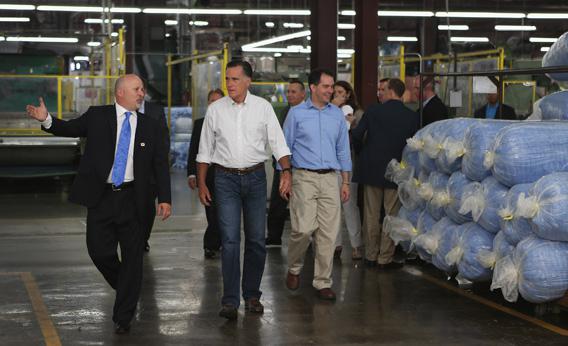Mitt Romney’s presidential campaign spent the weekend mired in a tortured dispute over a seemingly absurd question: When is the CEO and sole shareholder of a company he founded not responsible for the actions of the company? The Romney camp’s answer is that it’s unfair to criticize him for offshoring, outsourcing, and layoffs at Bain-controlled companies between 1999 and 2002 because in practice he was on a leave of absence running the Salt Lake Olympics. Senior adviser Ed Gillespie, speaking on CNN’s State of the Union on Sunday, explained that when Romney was elected governor of Massachusetts in November 2002, he “retired retroactively” at the date on which he first took leave.
These efforts to wriggle out of accountability for a business career that Romney has cited as a key qualification for the presidency are fundamentally lame. The timing of the kerfuffle distracts from the actual substantive question about Romney’s Bain tenure: Did Bain’s management team do anything wrong by shipping jobs overseas when they thought doing so would be profitable?
The answer is almost certainly no. Nothing that occurred during the Bain transition period was out of step with the fundamental orientation of the company Romney created and hadn’t yet left. If Romney were a less pathologically risk-averse politician, he would defend what Bain did after 1999 and point out that there’s nothing wrong with companies shifting production offshore.
A good intuition check here is to note that nobody seems to think there’s anything wrong with offshoring when the United States is the offshore production site. And yet that’s often exactly what we are. Once upon a time Japanese and German cars were imported to American shores. Today that’s relatively rare. The American market is large enough, and the U.S. workforce sufficiently productive, that it makes sense for Toyota and BMW and the rest to manufacture on our soil. At the moment, all Airbus planes flying in the United States are imported from Hamburg, Germany, or Toulouse, France, but soon the popular A320 series will be made in Alabama. SolarWorld, one of the leading photovoltaic manufacturers in the country, is a division of a German company. And the same thing happens outside the manufacturing sector. The British magazine the Economist employs American writers, some of whose output is read by a European, U.K., or Asian audience. That’s outsourcing!
Rules requiring firms to restrict employment to their country of origin would be hideously inefficient if applied on a global basis, and they would be every bit as devastating to American employees of foreign firms as offshoring by American firms is to workers who lose their jobs here. (One might also ask where the borders of corporate patriotism ought to be. If it’s wrong for a Michigan-based car company to have a supply chain that extends to Mexico, why is Ohio OK? After all, it hardly makes a difference to a laid-off worker where exactly his job went—the bad news is that he lost his job.)
Over the long run, we’re all going to be more prosperous if we live in a world where firms are allowed to locate work where it’s most efficient to locate it. This is exactly why, despite some tough ads, the Obama administration has not proposed any policies to restrict firms’ freedom to shift work across state or national boundaries.
Romney’s unwillingness to make the case for outsourcing reflects, in part, political timidity. But more broadly, it underscores that although he’s been an eager participant in contemporary capitalism, he’s not willing to mount a policy response to its vicissitudes.
A couple of hundred of years of catastrophic misgovernment and imperialist exploitation left billions of Asians languishing in dire poverty. When Asian governance started improving, Asian workers’ productive capacity and earnings potential skyrocketed. This has been a triumph for human welfare but a disaster for Americans whose skills have been radically devalued in the process. And these kinds of shocks happen all the time in a dynamic market economy. The information technology revolution has ruined the livelihoods of all manner of businesses—typewriter repair shops, film developers, record stores, Blockbuster—run and staffed by hardworking, decent people. Technical progress, like economic growth in China, is beneficial on net, but that’s little solace to the specific individuals who lose out.
The good news is that a growing economic pie lets us use tools like progressive taxation and the welfare state to make sure that everyone shares in prosperity. A Mitt Romney willing to run on his record would be ideally positioned to make that point. As a businessman, he shifted work to the most efficient possible location, enhancing society’s overall stock of goods and services. And as governor of Massachusetts, he undertook an important expansion of the social safety net, bringing universal health care to American shores for the first time. But as a presidential candidate, he’s run away from his record as governor by proposing to raise taxes on the poor and slash them on the rich while gutting social safety-net spending in favor of low revenues and an increased military budget. That’s left Romney running from his business record, too, rather than just admitting that good business executives regularly unleash pain in pursuit of profit and efficiency.
